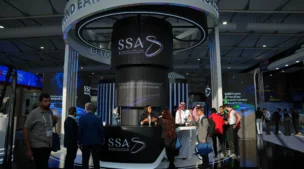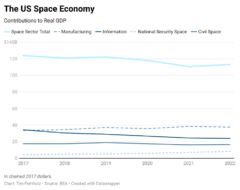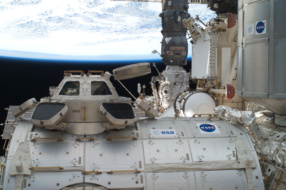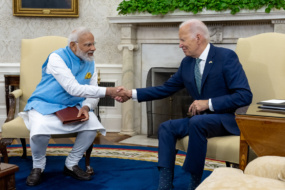On Friday, US Vice President Kamala Harris spoke about US off-Earth policy as she convened the second meeting of the US National Space Council (NSpC). Broadly speaking, the Harris-led NsPC’s priorities are three-fold:
- Expanding America’s STEM workforce
- Using on-orbit assets to fight climate change
- Promoting international space-faring rules and norms
Then and now…Speaking from Johnson Space Center, Harris recalled JFK’s legendary “we choose to go to the moon” speech, delivered 60 years ago today across town at Rice University.
Harris hailed the success of Project Apollo, and the US’s whole-of-government mobilization in the 1960s to put American boots on the Moon before the decade was out. With Artemis, we’re not only going back, but building the first space station in lunar orbit, staying permanently at the first lunar basecamp, and landing the first woman and person of color on the Moon.
“In the decades since [JFK’s speech], America has orbited Mercury, landed rovers on Mars, and flown by Pluto. We have looked back on our Earth from billions of miles away,” Harris said, and built JWST, “a telescope powerful enough to observe our universe as it was billions of years ago.”
But we’re still early…Still, the VP said, we’re just scratching the surface. “In a very real sense, we have only just begun our journey into space,” Harris said. “There is so much we still don’t know and so much we still haven’t done. Space remains a place of undiscovered and unrealized opportunity.”
Collaboration + competition: In her remarks, the VP also focused on the multilateral aspects of the White House’s space doctrine. Washington must lead on rules and norms that “reaffirm the rights of, and demand responsibility from, all space-faring nations.” Harris called out:
- Eight more nations signing the Artemis Accords, bringing the total to 21
- The US extending its ISS commitment through 2030
- The US commitment not to conduct destructive anti-satellite (ASAT) testing
And something new: Later this month, the US will introduce a resolution at the UN General Assembly calling on other countries to also ban ASAT testing.
Private sector: The VP praised the private sector’s recent contributions to space, and said that over a dozen companies are helping to develop and level up the US workforce. The commercial sector is developing the first generation of commercial stations, can dock satellites in orbit, remove debris, and soon, “will be able to repair and even build new structures while in orbit.”
+ While we’re here: There was a flurry of space policy news on the tail end of last week, so you’d be excused for having missed it heading into the weekend.
- The FCC dropped new draft deorbiting guidelines.
- The Pentagon and Commerce Dept. announced a partnership to cooperate on space situational awareness (SSA), traffic monitoring (STM), and civil/commercial coordination.
- The NTSB and FAA signed an agreement to collaborate on commercial space accidents and investigations.




